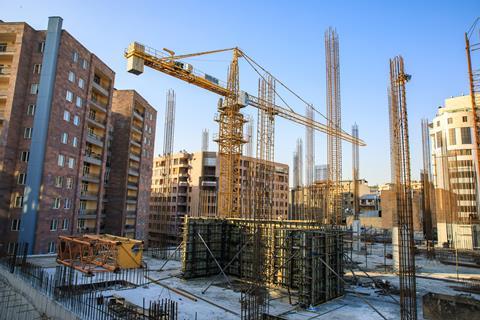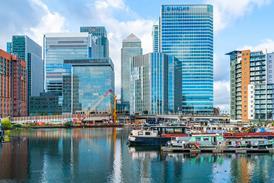“Cash is king.” Never has that well-worn business maxim been more imperative than now, as the country locks down in response to the global coronavirus pandemic.

Within the past couple of weeks, dozens of stock-market-listed housebuilders, developers and materials producers have scrambled to cancel dividends, land-buying and investments, while many have cashed in every penny of their corporate overdrafts.
Many companies have now moved on to a second and more gloomy series of Covid-19 updates. On 10 March, estate agent LSL informed shareholders there had been “some slight softening” in the market. But a week after the national lockdown was enacted on 23 March, the company judged that activity levels had “dropped very sharply”.
Housing data provider Hometrack forecasts that transaction volumes could fall by up to 80% in the months ahead. That at first might seem an optimistic assumption, but there had been a degree of momentum from sales processes started in the now-hazy burst of post-election optimism. The problem is completing deals, given the recent government advice for buyers and sellers to “amicably agree” to delay until stay-at-home measures are lifted.
This could be especially bad for estate agents: they had been in full flight, running up costs, and, of course, they don’t get paid until keys are handed out. Smaller agents, however, have experience in retrenching when the cycle turns.

For housebuilders, it could be tougher. They do generally collect deposits or reservation fees at the start of the building process, but then run up considerably higher costs in work-in-progress.
This can be highly seasonal, with the peak of indebtedness around May, before cash comes flooding in with a spike in home completions ahead of the summer holidays. With this in mind, a number of the housebuilders have attempted to keep working on homes that are almost finished.
Sites shutting down
But this has generated a wave of largely ill-informed opprobrium from some politicians and the media: construction workers are high-viz in more ways than one. Even if they can now make it to site, it’s becoming increasingly unlikely that all the materials will, so companies that had aimed to soldier on have thrown in the towel.
One obvious cash saving is cancelling dividends and scheduled special returns of supposedly ‘excess’ cash (but a big problem for your pension fund). All but contracted land-buying has been cancelled (and some housebuilders are past masters at wriggling out of committed deals, usually by throwing spanners in the works of the planning process many so regularly decry).
At least theoretically this could lead to land prices falling very sharply; in reality, lower prices will only crystallise if holders are forced to sell due to their own liquidity challenges.
Housebuilders and suppliers have also gone into full-flung cost saving, which has included directors of a succession of companies, initially McCarthy & Stone, taking hefty voluntary pay cuts, with the highest being 50% at specialist distributor SIG.
But one more extreme response adopted by a swathe of companies is to draw down their entire revolving credit facilities, or RCFs. This is essentially the same as going to your overdraft limit and stashing the proceeds in a savings account. The suspicion might be they fear that their lenders may withdraw the facilities.
This, however, may be more cosmetic, since having separately disclosed cash balances looks more reassuring, even though it makes no difference to net debt.
“Possession is seen to be nine tenths of the law,” an industry source told me. But he dismissed any question that major housebuilders risk their banks pulling the plug on them. No one major went bust in the last crash (although a few teetered dangerously close to the edge), with banks conceding they would end up holding huge land banks and half-finished homes.
There is, however, one niche of the development industry where a doomsday scenario might unfold: the high-rise, high-spec sites conceived by mainly foreign developers and funded largely by foreign debt.
Who knows what financial health some of these now find themselves in? Those developers that a month ago entered the crisis with the luxury of hefty cash piles, rather than having to hold on to every last penny, can probably look forward to the mother of all fire-sales.
Alastair Stewart is an equities analyst and consultant





























No comments yet